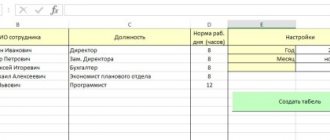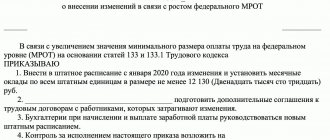Kinds
It’s worth starting with the fact that an employee has the right to go on regular leave under the Labor Code in the following cases:
- When it was time for his annual holiday.
- If he is already on vacation, but it needs to be extended.
- In case of pregnancy and childbirth. Then this is also called vacation, not sick leave.
- While studying.
Vacations can also be paid or unpaid. More details about the main types listed later in the article, and for explanations and comments about vacations in Russia, you can read in the chapter of the Labor Code of the Russian Federation.
https://youtu.be/GDWeevl8gHA
Leave order for employees with children
In 2020, changes to the Labor Code came into force (Article 262.2 was added) according to which employees who have three or more children under 12 years of age have the right to choose a convenient rest time when drawing up a vacation schedule for the next year.
Attention: in addition, according to Art. 262.1 of the Labor Code of the Russian Federation, one of the parents of a disabled child under 18 years of age (or a foster parent, trustee or guardian) also has the right to choose a time of rest in the company that is convenient for him.
Duration and additional days
This question is one of the most important when providing rest, since many working citizens do not know how much rest they are entitled to have per year. So, in 2020, the minimum paid number of vacation days by law is 28. It’s worth saying right away that doctors, police officers, teachers and other similar categories of workers have the right to extend their vacation on a paid basis due to the nature of the profession. Since 2020, civil government employees referred to in this Federal Law have not 35 days of rest per year, but 30.
According to the Labor Code of the Russian Federation, in addition to the main 28 days of annual paid leave, you can get several more in the following cases:
- Working with the military registration area assumes that an additional week is provided for vacation.
- For an irregular work schedule - 3 days above minimum, but the employer can give more.
- If there are conditions specified in the Decree of the Government of the Russian Federation.
Additional days are also given for length of service:
- From 1 to 5 years - a day for vacation.
- From 5 to 10 – 5 days.
- From 10 to 15 years – a week.
- Over 15 years of experience – additional 10 days.
This rule has changed quite recently; previously, the number of years of experience was equal to the number of days of vacation.
Accounting for weekends
This point raises questions and disputes among many working citizens, so it is worth highlighting separately. When calculating the duration of vacation, weekends are equal to working days. This means that if, for example, an employee takes a vacation for 7 days, two of which are weekends, then these 7 days will be paid for and that week will be deducted from the annual reserve.
But with holidays the situation is different. They are not considered regular days off, therefore, if an official public holiday occurs during a vacation, these days are not paid and are not included in the vacation account under Article 120 of the Labor Code of the Russian Federation. All these days are marked in the vacation schedule in a special way so as not to create confusion.
Leave sharing rules
It is also worth saying that it is possible to divide the vacation into parts and it is not necessary to rest all the allocated 4 weeks at once. Not everyone knows how to do this correctly either, so this point is worth highlighting separately.
So, if an agreement is reached with the employer and it fits the vacation schedule of colleagues, the employee can divide his vacation into as many parts as he likes. However, it is worth remembering that according to Russian legislation, or more precisely Article 125 of the Labor Code of the Russian Federation, one part of a division must last at least 14 days. The remaining 14 days can be divided into parts lasting at least one day each, and then the rest according to the law can be divided into a maximum of 15 parts.
If an employee gets sick while on vacation
The law obliges the company administration to postpone annual paid leave if an employee becomes ill or injured before or while on leave. This rule also applies to annual additional paid leave.
The procedure for transferring leave directly depends on the moment at which the employee informed the administration about the opening of sick leave:
- The employee immediately, upon opening a sick leave, notified the company about the illness in writing or orally. Based on this, he will extend the current leave for the duration of his illness. In this situation, there is no need to issue an additional order or recalculate vacation pay. After returning from vacation, the employee provides a sick leave certificate.
- After the end of the vacation, the employee appeared at his place and presented a closed sick leave certificate. Then he immediately needs to write a statement indicating new vacation days. The law requires that they must be agreed with management. In this case, paid vacation pay is subject to recalculation, and the excess will be offset as an advance towards future salary.
It makes no difference at what point the employee reported his illness - sick leave payments in any situation must be made as usual.
Vacation days cannot be transferred if the sick leave was issued to care for a sick child or relative.
Attention: if an employee takes leave with further dismissal, it is no longer extended, but sick leave is paid in full.
Additional leave
Sometimes citizens need additional leave. They can receive it either paid or unpaid. Thus, according to the Labor Code of the Russian Federation, the following citizens can receive additional paid leave:
- Minors.
- Having an irregular work schedule.
- Disabled people.
- Employed in harmful or dangerous work.
- Working in the Far North.
- Whose work is related to sports, medicine or education.
- Employees of government agencies of supervisory significance and the military.
- Victims of the Chernobyl accident and other similar disasters.
- Those working in places with special working conditions. For example, divers working with the police or the Ministry of Emergency Situations.
The employer has the right to establish additional holidays for certain positions in employment contracts.
Now it’s worth talking about vacations for which payment is not provided. That is, working persons have an additional supply of days per year, but they will not be paid. These citizens include:
- WWII participants have 35 days a year.
- Old-age pensioners, as well as spouses of those killed in the line of duty or from an industrial disease - an additional unpaid 2 weeks.
- For disabled people of all groups, the number of days of regular leave under the labor code in 2020 can be increased by 60 unpaid days annually.
During the death of a relative, when registering a marriage and the birth of a child, the law provides, albeit unpaid, 5 days. Also, persons who combine work and study have a period of unpaid leave when they need to take exams or pass entrance examinations. In this case, the educational institution must have state accreditation.
Only the employee himself can complete the vacation; the employer only issues an order for the person to go on vacation.
How will the number of paid vacation days change in 2020?
- The quality of diagnostics is improving, which makes it possible to detect a person’s disease at an early stage;
- The risk of developing chronic diseases leading to disability or even death is reduced to a minimum;
- The quality of health care is becoming much higher;
- Treatment and rehabilitation measures are prescribed and carried out in a timely manner, which significantly improves the health of working citizens, reduces the incidence rate and has a positive effect on the life expectancy of the population.
This is important to know: What percentage of vacation pay from salary
In fact, the majority of officially working citizens try to ignore such a duty, justifying themselves with a busy work schedule that coincides with the work schedule of medical institutions. But it happens that the administration of the organization interferes with the inspection, not providing its employees with a separate day to resolve the issue.
Procedure for granting leave
To begin with, it is worth saying that you can request a vacation not a year after receiving the position, but after six months. Few people know about this. Even earlier leave can be received by:
- Women hired during pregnancy or who began working only after maternity leave.
- Persons who adopted a child under 3 months of age.
- Minors.
These periods are also not subject to the schedule drawn up annually in the organization. All other employees must apply for the dates they wish to take time off. If there is a conflict in dates, employees must independently agree with each other to resolve this situation; the employer, by law, does not have the right to send someone on vacation on their own.
The schedule is approved and drawn up 2 weeks before the start of the new calendar year. For non-compliance, the head of the organization will have to pay a fine of 50,000 rubles to the state.
An employee has the right to change the time of his vacation, but only if there are more compelling reasons than family circumstances. Also, a citizen can be called back from vacation, but he will begin his duties ahead of schedule only at his own request, this is not punishable. The following categories of employees cannot be called back from vacation:
- Minors.
- Those on maternity leave or parental leave.
- Those who work in harmful or dangerous industries.
After the employee is convinced that he can take a vacation and what kind of vacation he wants - paid or not - he can write an application addressed to the head of the company. The link contains a sample of such a document. After submitting it, going on vacation will not result in absenteeism. It is important to decide in advance whether this application will be ordinary or followed by dismissal.
Rest or receive compensation
In general, payment for unused vacation occurs upon dismissal of an employee. However, if the employee wishes, compensation can be paid instead of vacation. But there are limitations.
Firstly, you cannot completely replace vacation with cash payments. Compensation is possible only for unused days remaining from previous years or for additional vacation time. It is prohibited to replace the required 28 days of the current year with compensation.
Secondly, the law does not allow replacing any number of vacation days for employees of certain categories:
- pregnant women;
- minors;
- employed in hazardous industries;
- customs officers;
- police officers;
- employees of other government bodies, if this is expressly stated in internal regulations or legislation.
If an organization pays compensation instead of basic leave, it may be fined.
Vacation pay
If the vacation is paid, then the money must arrive in the employee’s account 3 days before going on vacation or earlier. The law does not establish a procedure for paying vacation pay the day before the holidays, so this may be a violation and also entail a fine for non-compliance with the rules for providing vacation. But there will be a greater fine if you don’t pay vacation pay at all.
Therefore, it is better to make payments on time so as not to cause problems with inspection authorities due to trifles. The correctness of the calculation of vacation pay is also checked, so special attention should be paid to this, otherwise the employee has the right to complain to the Labor Inspectorate.
In what case should you write a vacation application?
The vacation period for each employee in the company is provided according to the vacation schedule approved by the enterprise.
It must be observed by all parties to the employment relationship. In the schedule, the vacation period can be reflected in the form of indicating a month of rest or by recording the exact start and end dates of this period. In addition, the employer is required to notify the employee of the start of vacation at least two weeks before the start of this period.
In connection with this legislation, under normal conditions, the employee does not provide for the preparation of an application for leave, since the start and end times of the leave are determined, the duration is agreed upon by each party to the employment contract.
In practice, many companies include this document in the personnel document flow and ask employees to prepare such statements.
But in certain situations, a vacation application is a mandatory document:
- If the company does not have a vacation schedule. But the administration must understand that such a situation is a violation of the law and sanctions in the form of a fine in the amount of 50,000 rubles may be applied to a business entity.
- The application must be submitted by an employee who joined the employer during the current year, so he is not included in the approved vacation schedule.
- The exact date of granting leave is not reflected in the leave schedule. For example, the month indicated is September 2020.
- If, on the initiative of either the employee or the company administration, vacation is granted at a time other than that stated in the schedule. That is, this period is transferred.
It is recommended to apply for leave in any case. This will avoid the occurrence of controversial situations.
In addition, according to the rules, if an employee decides to go on urgent leave and the administration agrees to this, then the period for payment of vacation pay begins to be calculated from the moment the employee receives an application for vacation.
Attention: if an employee goes on vacation at a time other than that recorded in the vacation schedule, only on the basis of a verbal agreement with managers, then if the director forgets or ignores this fact, without written agreement on new vacation dates, the absence of an individual in his place will be considered absenteeism, for which he could be fired.
There was no rest at all: what will happen to that?
There are situations when a person works for two or even three years and never took a break at all. This is a direct violation of Labor legislation, according to which management will have to pay a fine of up to 50,000 rubles or the labor inspectorate will suspend the company’s activities. In this case, the employee retains all unused vacation days - they do not expire over the last two years.
According to the law, in 2020, an employee has every right to take all the time off he is entitled to at one time. If the employee is not given the required days, which sometimes number more than 80, then sanctions will be imposed on the company.
In what cases can vacation days be extended or transferred to another date:
- if the employee underwent inpatient treatment during the planned vacation;
- if, while on a well-deserved rest, a person was involved in the performance of government duties, he went to work on certain days;
- in other cases provided for by the specific company in which the person works.










